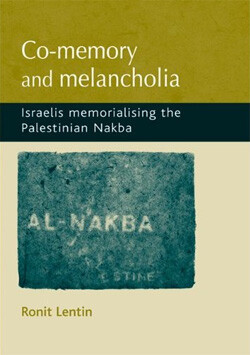The Electronic Intifada 26 January 2011

That these issues are of more than theoretical import for Lentin is evident from her 1989 novel Night Train to Mother, and from this book’s autobiographical/biographical (or “ethnobiographical”) strand concerning her father who, as a soldier, may or may not have participated in ethnically cleansing Palestinians from Haifa in 1948. Indeed, a sense of personal trauma sometimes seems to cry out from the text, adding a dimension intriguingly at odds with its aspirations to “dry” academic objectivity: “I cannot stop wondering why we do this work” (53).
Following Freud, who “posit[ed] memory as the root cause of trauma but also the source of its resolution,” Lentin defines mourning as “a finite reaction to loss” focusing on a specific object in the knowledge that it no longer exists and constituting a step towards healthy acceptance of that loss. Melancholia on the other hand, which “can regress into narcissism,” is a pathology that “shifts the mourning from the lost object to the grieving subject” (50-51).
She questions whether “co-memorizing the Nakba in Hebrew shifts the object of commemoration from the colonized Palestinians to the colonizing Israelis who use this commemorative act to construct their own (Israeli Jewish) identity” (129). The “necessary conclusion of commemorating the Nakba must be recognizing the Palestinian right of return” (164), which ultimately entails “calling for the demise of Israel as a Jewish state” (169).
Lentin tells us (128) that “the impetus for writing this book owes a lot to the work of Zochrot” (Hebrew for “remembering”), an Israeli Jewish nongovernmental organization founded in 2002 that aims to raise awareness of the Nakba among Jewish Israelis by, for example, “organizing tours to Palestinian villages destroyed in 1948,” and “post[ing] signs that commemorate different sites in the depopulated villages … and giv[ing] details about each of them through testimonies of refugees” (135).
Her chapter on Zochrot (127-152) begins with an account of her uneasy relationship with the organization and its founder and director Eitan Bronstein. He claimed she had “misrepresented the group’s work and intentions” in a 2008 paper, in which she had also mentioned “a former Palestinian Zochrot member” whose words she had quoted without explicit permission, thus herself becoming guilty, in her own terms, of “appropriating the Palestinian voice.” “This exchange,” she tells us, “made me rethink both my methodological approach and my analysis” of Zochrot’s activities, which she had accused with some harshness of “perpetuat[ing] rather than contest[ing] the ongoing colonization of Palestine” (127-8).
Such harshness becomes comprehensible when one reads that Bronstein has described his relationship with the sites of Palestinian dispossession as a “conquest.” Lentin quotes Zochrot member Tamar Avraham: “I realized he didn’t understand my problem, because … [f]or me, with my European, anti-colonial background conquering is always negative, whereas for him, out of Zionist tradition and language, it is something positive” (148-9).
Similarly, Jeff Halper of the Israeli Committee Against House Demolitions (ICAHD) is criticized for using the phrase “redeeming Israel” in the subtitle of his book An Israeli in Palestine. Lentin claims that “[t]he Palestinian other and his oppression by the Israeli house demolition policies seems to be subsumed into the anecdotal telling of the self-realization of the hegemonic Israeli ‘we’ ” (97).
Machsom Watch, “a group of women who observe [Israeli army] checkpoints and report their observations online,” while “important … in alerting the Israeli and global publics to the checkpoint regime,” nonetheless “arguably enables the military to maintain this draconian regime, and … inadvertently justifies its excesses” (132).
Surely, however, Halper has made an exemplary journey from unthinking Zionist to oppositional Israeli activist; his lucid analysis of Israel’s “matrix of control” is an indispensable reference point. Bronstein and Zochrot have come to advocate the Palestinian right of return after an elaborate and ongoing process of consultation and self-criticism, scrupulously detailed by Lentin, and have indeed taken some of her strictures on board (128). Machsom Watch, as she acknowledges, is split between advocates of resistance versus advocates of protest and hence, like Zochrot, is presumably “an evolving group” (150).
Lentin counterposes the anti-Zionist architect Eyal Weizman’s “potent argument” that, as she paraphrases him, “those who oppose the state participate in producing its oppressive policies” (possibly the most demobilizing formulation imaginable), with the ex-Israeli British-based musician Gilad Atzmon’s contention that to oppose Zionism “as a Jew” is to accept Zionism. Lentin situates herself somewhere in the middle. She acknowledges that her “own opposition does stem from [her] own Israeli Jewishness” but has led her to a “not merely identitarian but rather political” activism leading to advocacy of the Palestinian right of return (163-4).
The issues raised by Lentin in this dense and often forbidding book are of central importance, and one hopes that her critique of the narcissism often marring the effectiveness of internal Israeli resistance to Zionism will itself contribute to that resistance.
At times, however, I fear that the fierceness of this critique may itself prove demobilizing, convincing Israeli activists that “they can’t win.” I miss an acknowledgment that there is a younger generation of Israeli activists unhampered by the shackles of memory, indifferent to conquest or redemption, and prepared to risk life and limb alongside their dispossessed Palestinian comrades and international militants in resisting the actions of the Israeli military (for example, Anarchists Against the Wall). I also miss an advocacy of boycott as the most powerful tool to isolate the Zionist regime and convince it that there is a price to pay for its racist and colonial policies. Perhaps melancholia and mourning can only be transcended by mobilization.
Raymond Deane is an Irish composer and political activist.
Related Links




